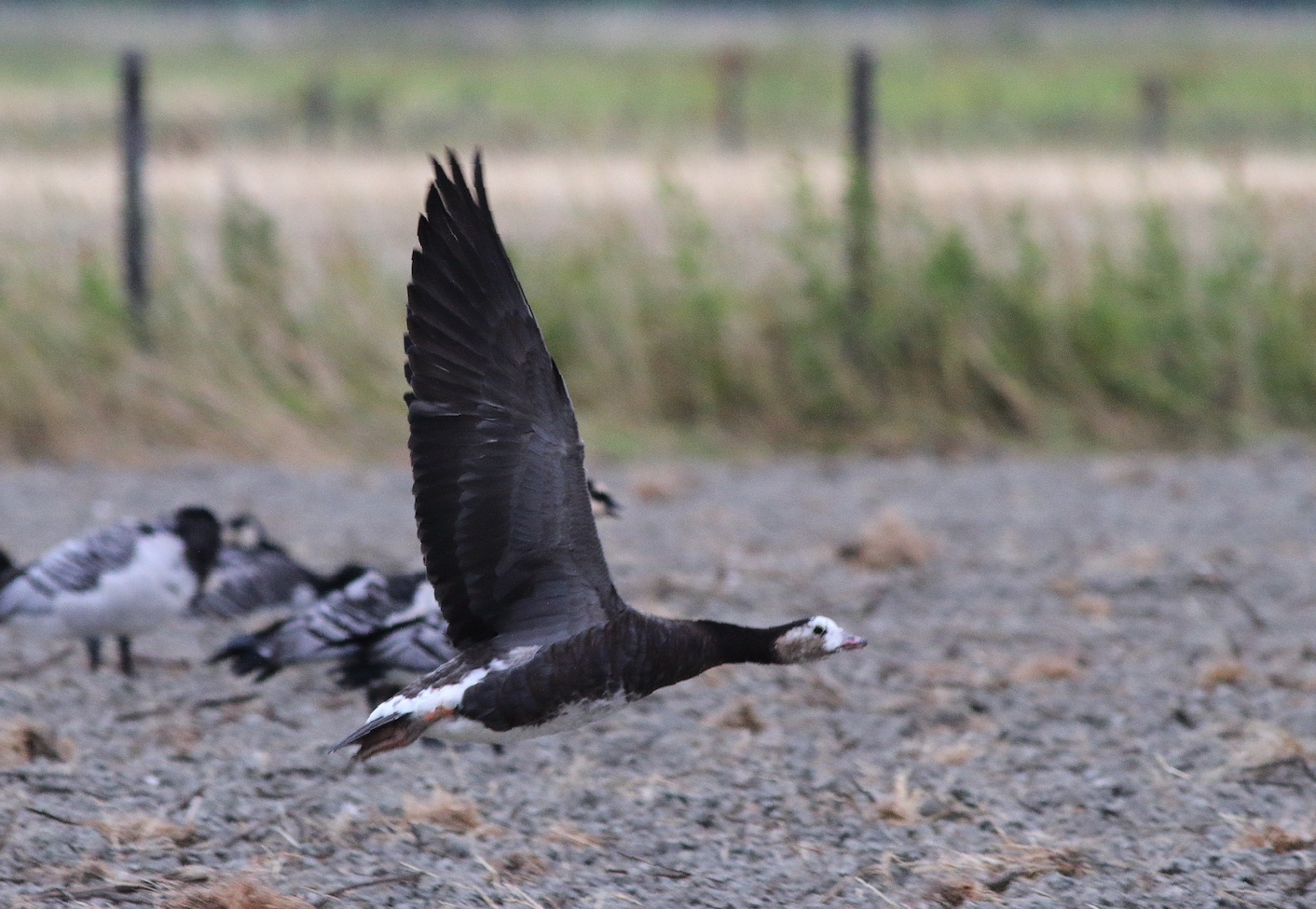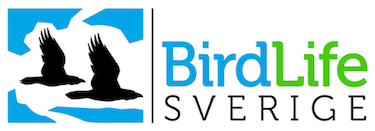Fosterföräldrar i artbevarandeprojekt kan skapa motstridiga mål: Hybridisering mellan fjällgås Anser erythropus och vitkindad gås Branta leucopsis
DOI:
https://doi.org/10.34080/os.v31.22430Nyckelord:
translokering, mellansläkteshybrid, utbredning, övervintringsområde, flyttväg, AnatidaeAbstract
Following the use of Barnacle Geese Branta leucopsis as foster parents in a conservation program for the endangered Lesser White-fronted Goose Anser erythropus in Sweden 1981–1999, mixed breeding pairs of the two species were established in the wild. We find indications that this was related to shared moulting habits of the two species in the Bothnian Sea during late 1990s. Starting in 2003, five mixed pairs produced at least 49 free-flying hybrid offspring until 2013, when the last breeding was confirmed. Reported numbers of hybrids did not increase in parallel to the production of young hybrids over time. After 2013, the number of hybrids started to decrease in Sweden and the Netherlands. Lower numbers of hybrids than expected can partly be explained by management actions taken, but may also be associated with low survival due to genetic outbreeding. Mixed pairs and their offspring entirely adopted the migratory habits of Barnacle Geese, overlapping very little with sites used by Lesser White-fronted Geese. We find no evidence that the hybrids ever posed a serious threat to Lesser White-fronted Geese breeding in Fennoscandia.
Nedladdningar
Referenser
Allendorf FW, Leary RF, Spruell P & Wenburg JK. 2001. The problems with hybrids: setting conservation guidelines. Trends in Ecology & Evolution 16: 613–622. https://doi.org/10.1016/S0169-5347(01)02290-X DOI: https://doi.org/10.1016/S0169-5347(01)02290-X
Andersson Å. 2019. Projekt Fjällgås – en dokumentation. Svenska Jägareförbundet. Viltforum 1/2016.
Andersson Å & Holmqvist N. 2010. The Swedish population of Lesser White-fronted Goose Anser erythropus – supplemented or reintroduced? Ornis Svecica 20: 202–206. https://doi.org/10.34080/os.v20.22620 DOI: https://doi.org/10.34080/os.v20.22620
Bengtsson K. 2007. Vitkindad gås – det rysk/baltiska beståndets expansion. Anser 46: 137–162.
Berndt RK, Bruns HA & Koop B. 2001. Ornithologischer Jahresbericht für Schleswig-Holstein 1998 . Corax 18: 241–279.
BirdLife Sweden. 1998–2005. Annual reports. Fågelåret 1998–2005. Sveriges Ornitologiska Förening/BirdLife Sweden, Halmstad.
Black JM, Prop J & Larsson K. 2014. The Barnacle Goose. T & AD Poyser, London.
Bruns HA & Berndt RK. 1999. Ornithologischer Jahresbericht für Schleswig-Holstein 1997 . Corax 17: 279–319.
Díez-del-Molino D, von Seth J, Gyllenstrand N, Widemo F, Liljebäck N, Svensson M, Sjögren-Gulve P & Dalén L. 2020. Population genomics reveals lack of greater white-fronted goose introgression into the Swedish lesser white-fronted goose. Scientific Reports 10: 18437. https://doi.org/10.1038/s41598-020-75315-y DOI: https://doi.org/10.1038/s41598-020-75315-y
Ebbinge BS, van Biezen JB & van der Voet H. 1991. Estimation of annual adult survival rates of Barnacle Geese Branta leucopsis using multiple resightings of marked individuals. Ardea 79: 73–112.
Fabricius E. 1991. Interspecific mate choice following cross-fostering in a mixed colony of Greylag Goose Anser anser and Canada Goose Branta canadensis. A study on development and persistence of species preferences. Ethology 88: 287–296. https://doi.org/10.1111/j.1439-0310.1991.tb00283 DOI: https://doi.org/10.1111/j.1439-0310.1991.tb00283.x
Ganter B, Larsson K, Syroechkovskiy E, Litvin KE, Leito A & Madsen J. 1999. Barnacle Goose Branta leucopsis Russian/Baltic. Pp 270–297 in Goose populations of the Western Palearctic. A review of status and distribution (Madsen J, Cracknell G & Fox AD, eds). Wetlands International Publication No. 48. Wetlands International, Wageningen, the Netherlands & National Environmental Research Institute, Rønde, Denmark.
Gonzalez J, Duttman H & Wink M. 2009. Phylogenetic relationships based on two mitochondrial genes and hybridization patterns in Anatidae. Journal of Zoology. 279: 310–318. https://doi.org/10.1111/j.1469-7998.2009.00622.x DOI: https://doi.org/10.1111/j.1469-7998.2009.00622.x
Greig JC. 1979. Principles of genetic conservation to wildlife management in Southern Africa. South African Journal of Wildlife Research 9: 57–78.
Hornman M, Hustings F, Koffijberg K, van Winden E, van Els P, Kleefstra R, Sovon Ganzen- en Zwanenwerkgroep & Soldaat L. 2020. Watervogels in Nederland in 2017/2018. Sovon-rapport 2020/01, RWS-rapport BM 19.18. Sovon Vogelonderzoek Nederland, Nijmegen, the Netherlands.
Jackiw RN, Mandil G & Hager HA. 2015. A framework to guide the conservation of species hybrids based on ethical and ecological considerations. Conservation Biology. 29: 1040–1051. https://doi.org/10.1111/cobi.12526 DOI: https://doi.org/10.1111/cobi.12526
IUCN/SSC. 2013. Guidelines for reintroductions and other conservation translocations. Version 1.0. IUCN Species Survival Commission, Gland, Switzerland.
Jeromin K, Koop B, Berndt RK & Kühn M. 2014. Ornithologischer Jahresbericht für Schleswig-Holstein 2006–2008. Corax 22: 337–477.
Jones T, Martin K, Barov B & Nagy S (compilers). 2008. International Single Species Action Plan for the conservation of the Western Palearctic population of the Lesser White-fronted Goose Anser erythropus. AEWA Technical Series No. 36. UNEP: Agreement on the Conservation of African-Eurasian Migratory Waterbirds, Bonn, Germany.
Kampe-Persson H & Lerner H. 2007. Occurrence of hybrid Geese in Sweden—a conservation problem? Ornis Svecica 17: 154–186. https://doi.org/10.34080/os.v17.22681 DOI: https://doi.org/10.34080/os.v17.22681
Kampe-Persson H. 2020. Occurrence of the Lesser White-fronted Goose Anser erythropus in Latvia: linking migration to conservation. Environmental and Experimental Biology 18: 249–269. http://doi.org/10.22364/eeb.18.25 DOI: https://doi.org/10.22364/eeb.18.25
Kölzsch A, Müskens GJDM, Szinai P, Moonen S, Glazov P, Kruckenberg H, Wikelski M & Nolet BA. 2019. Flyway connectivity and exchange primarily driven by moult migration in geese. Movement ecology 7: 3. https://doi.org/10.1186/s40462-019-0148-6 DOI: https://doi.org/10.1186/s40462-019-0148-6
Koffijberg K, Cottaar F & van der Jeugd H. 2005. Pleisterplaatsen van Dwergganzen Anser erythropus in Nederland. Sovon-informatierapport 2005/06. Sovon Vogelonderzoek Nederland, Beek-Ubbergen, the Netherlands.
Koffijberg K, Cottaar F & van der Jeugd H. 2006. Toename van Dwergganzen in Nederland in 1989–2005. Limosa 79: 107–122.
Koffijberg K & van Winden E. 2013. Lesser White-fronted Geese in The Netherlands: a review of trends, phenology, distribtuion patterns and origin. Sovon-rapport 2013/48. Sovon Vogelonderzoek Nederland, Nijmegen, the Netherlands.
Koop B, Jeromin K, Günther K, Mitschke A & Berndt RK. 2007. Ornithologischer Jahresbericht für Schleswig-Holstein 2001 . Corax 20: 201–240.
Koop B, Jeromin K, Berndt RK, Mitsche A & Günther K. 2009. Ornithologischer Jahresbericht für Schleswig-Holstein 2003–2005. Corax 21: 105–207.
Krüger T & Kruckenberg H. 2011. The Lesser White-fronted Goose Anser erythropus as a migratory bird in Lower Saxony: occurrence, threats and protection measures. [In German with English summary.] Vogelkundliche Berichte aus Niedersachsen 42: 89–110.
Kyrk C. 1987. Hybrid vitkindad gås × fjällgås. Fåglar i Stockholmstrakten 16: 16–17.
McCarthy EM. 2006. Handbook of avian hybrids of the world. Oxford University Press, Oxford, UK.
Muñoz-Fuentes V, Vilà C, Green AJ, Negro JJ & Sorenson MD. 2007. Hybridization between white-headed ducks and introduced ruddy ducks in Spain. Molecular Ecology 16: 629–638. https://doi.org/10.1111/j.1365-294X.2006.03170.x DOI: https://doi.org/10.1111/j.1365-294X.2006.03170.x
Nijman V, Aliabadian M & Roselaar CS. 2010. Wild hybrids of Lesser White-fronted Goose (Anser erythropus) × Greater White-fronted Goose (A. albifrons) (Aves: Anseriformes) from the European migratory flyway. Zoologischer Anzeiger 248: 265–271. https://doi.org/10.1016/j.jcz.2009.10.003 DOI: https://doi.org/10.1016/j.jcz.2009.10.003
Ottenburghs J. 2017. Waarnemingen van Hybride Ganzen in Nederland tussen 2005 en 2016 . Limosa 90: 167–174.
Ottenburghs J, Megens H-J, Kraus RHS, Madsen O, van Hooft P, van Wieren SE, Crooijmans PMA, Ydenberg RC, Groenen MAM & Prins HHT. 2016a. A tree of geese: A phylogenomic perspective on the evolutionary history of true geese. Molecular Phylogenetics and Evolution 101: 303–313. https://doi.org/10.1016/j.ympev.2016.05.021 DOI: https://doi.org/10.1016/j.ympev.2016.05.021
Ottenburghs J, van Hooft P, van Wieren SE, Ydenberg RC & Prins HHT. 2016b. Hybridization in geese: a review. Frontiers in Zoology 13: 20. https://doi.org/10.1186/s12983-016-0153-1 DOI: https://doi.org/10.1186/s12983-016-0153-1
Randler C. 2008. Hybrid Wildfowl in Central Europe—an Overview. Waterbirds 31: 143–146. https://doi.org/10.1675/1524-4695(2008)31[143:HWICEA]2.0.CO;2 DOI: https://doi.org/10.1675/1524-4695(2008)31[143:HWICEA]2.0.CO;2
Ruokonen M, Kvist L & Lumme J. 2000. Close relatedness between mitochondrial DNA from seven Anser goose species. Journal of Evolutionary Biology 13: 532–540. https://doi.org/10.1046/j.1420-9101.2000.00184.x DOI: https://doi.org/10.1046/j.1420-9101.2000.00184.x
Schekkerman H & Koffijberg K. 2019. Annual survival in the Swedish Lesser White-fronted Geese. Sovon-rapport 2019/63. Sovon Vogelonderzoek Nederland, Nijmegen, the Netherlands.
Snäll T, Kindvall O, Nilsson J & Pärt T. 2011. Evaluating citizen-based presence data for bird monitoring. Biological Conservation 144: 804–810. https://doi.org/10.1016/j.biocon.2010.11.010 DOI: https://doi.org/10.1016/j.biocon.2010.11.010
ten Cate C. 1985. On sex differences in sexual imprinting. Animal Behaviour 33: 1310–1317. https://doi.org/10.1016/S0003-3472(85)80191-3 DOI: https://doi.org/10.1016/S0003-3472(85)80191-3
Todesco M, Pascual MA, Owens GL, Ostevik KL, Moyers BT, Hübner S, Heredia SM, Hahn MA, Caseys C, Bock DG & Riesberg LH. 2016. Hybridization and extinction. Evolutionary Applications 9: 892–908. https://doi.org/10.1111/eva.12367 DOI: https://doi.org/10.1111/eva.12367
van der Jeugd H, Olthof MP & Stahl J. 2001. Breeding range translates into site choice: Baltic and arctic Barnacle Geese Branta leucopsis use different habitats at a Dutch Wadden Sea island. Ardea 89: 253–265.
von Essen L. 1991. A note on the Lesser White-fronted Goose Anser erythropus in Sweden and the result of the re-introduction scheme. Ardea 79: 305–306.

Downloads
Publicerad
Referera så här
Nummer
Sektion
Licens
Copyright (c) 2021 Niklas Liljebäck, Kees Koffijberg, Christine Kowallik, Johan Månsson, Åke Andersson

Det här verket är licensierat under en Creative Commons Erkännande 4.0 Internationell-licens.
Författaren/författarna innehar copyright för varje enskilt bidrag, men samtliga bidrag är publicerade under en Creative Commons-licens, så att vem som helst kan dela och återanvända bidraget förutsatt att copyright-innehavaren erkänns.







